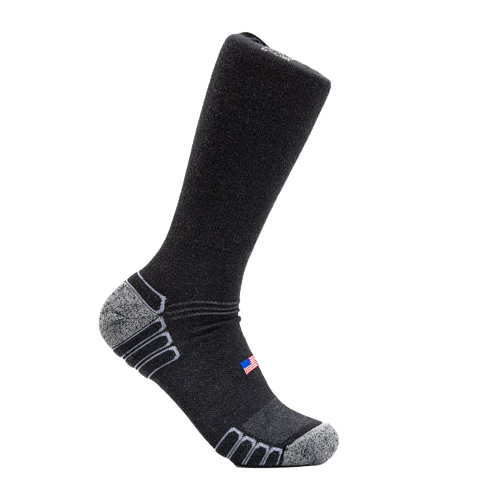Do you struggle with sweaty feet in your work boots?
Having damp, wet socks in the middle of the day is terrible, plus it can lead to moldy boots and stinky feet.
Here are a few hacks you can use to keep your feet dry in your work boots all day.
#1 Wear Sweat Wicking Merino Wool Socks

Always avoid cotton, polyester, and nylon socks when wearing work boots.
Merino wool is the best naturally sweat-wicking material there is---it's 35% better at wicking sweat compared to polyester, and 20% better compared to cotton. That comes as a surprise to a lot of people.
For most guys, investing in a high quality pair of Merino wool work socks is all they need to solve their foot sweat issues.
I wear Camel City Mill Crew wool work socks, and they're a game-changer. They also have the same socks in Boot and Ankle cut.
I once stepped in a deep puddle on a hunting trip while wearing these socks, and despite the poor waterproofing on my boots, my feet were dry again in literally 15 minutes.
#2 Buy Breathable Work Boots

With sweaty feet, moisture retention is public enemy number one, so you want breathable work boots with maximum airflow.
The worst thing you can do is get work boots with a synthetic lining. That's like wearing a trash bag on your feet.
Stick with a leather lined boot, or no lining at all. That'll ensure you don't have fabric that traps heat in.
Also, if you have a pair of waterproof boots, be aware that these can exacerbate your issue. Since waterproof boots are entirely lined with some sort of plastic (which is how they stay fully waterproof), your feet can't breathe, they get hotter, and they sweat more.
Otherwise, any Goodyear welted or stitchdown constructed boot will offer enough water resistance for your feet to stay dry in muddy conditions and the odd downpour.
#3 Use Foot Antiperspirants
I prefer a powder foot deodorant because you can pile it on and visually see how much you’re using. I simply douse my clean (and dry) feet with powder, coat the inside of my boots, then slip my feet in. I sometimes powder my socks, too.
Naturally, the sweatier you get, the more powder you’ll need. I used to use regular old talcum powder, and it works just fine. I suggest going for actual foot powders, though, since many of them have antifungal and antimicrobial properties.
Powder deodorant isn’t the neatest of options though, so if you want something a little more low maintenance (and don't have particularly sweaty feet), you could look at foot sprays. Just be aware that these fall more into the deodorizer category than the antiperspirant category.
#3 Opt for Comfort

Discomfort will cause your feet to sweat. On the safety front, the last thing you want is to be distracted by your shoes while you're operating a chainsaw or heavy machinery.
To help mitigate too much sweating, it’s essential that you do the following:
- Ensure you get the right size---boots that are too tight can exacerbate sweating.
- Pay attention to boot lining and footbed---while some footbeds are built for comfort, synthetic material traps heat and moisture.
Different shoe brands have different sizing, especially.
Do your do-diligence and make sure you know how your boots should fit, and use your true measurements for boots (which might not actually be the same as your shoe size). If your boots don’t fit well, you will sweat, and the extra rubbing and chafing will be a recipe for disaster.
It's also a important to pay attention to the boot's construction, and be aware that certain features can come with both positive and negative attributes. Some boots are built to be comfortable but sacrifice some breathability, like those with EVA footbeds, for example.
While EVA foam is incredibly comfortable, it won't do much for moisture-wicking. Always weigh up a boot's comfort pros and cons by whether they help or hinder your fight against sweaty feet.
#5 Try Shoe Insoles

Speaking of comfort, sometimes staving off sweaty feet is as simple as throwing some insoles in your work boots.
If you’re on a budget, and it’s simply discomfort that's making your feet sweat, shoe insoles are a good cheat code. Even the highest-end inserts won’t cost as much as an expensive pair of boots.
If you have flatter feet, opt for structured insoles with low or medium arch heights and deep cups for stabilization.
If you've got high arches, choose insoles that will relieve pressure on the balls and heels of your feet.
Regardless of your arch, your best bet is going to be on moisture-absorbing and antimicrobial inserts.
#6 Buy Two Types of Boots for Hot and Cold Weather
Don’t feel bad if this sounds like obvious advice and it never occurred to you. My first ever grown-up hunting trip was during pheasant season in South Dakota in the middle of January. I bought a pair of Kamik Goliath Boots, which are made from rubber and ridiculously insulated.
They ended up being my go-to boots for hunting trips all year long. It took me a good two years before I realized that it was more than just the spring-time sun making my feet sweat during turkey season in May.
Get well-ventilated boots for the summer and well-lined insulated boots for winter.
Breathable Boots and Quality Socks Should Solve Your Sweaty Feet

To avoid bacteria formation and fungal infections, make sure you aren’t letting your feet get too sweaty in your work boots.
The two big things you can change to reduce your foot sweat are:
- Get a great pair of Merino wool socks (I love the Camel City Mill Crews)
- Get a breathable pair of work boots
Buying breathable insoles and some moisture-control foot powder can get you so far. But if you want to tackle the problem at its most likely root cause, invest in a quality pair of socks and take a good look at your boots to assess if they're the sole cause of your sweaty feet.
And finally, if you think there’s a chance your sweat is excessive, it never hurts to see a doctor.






